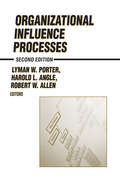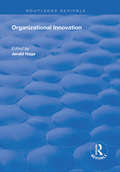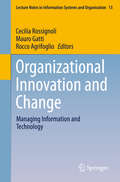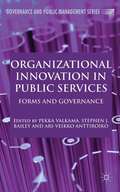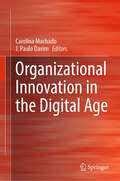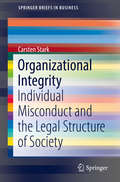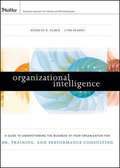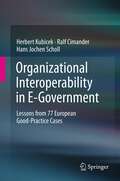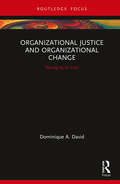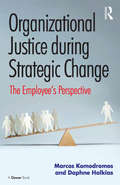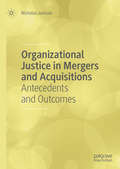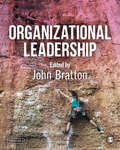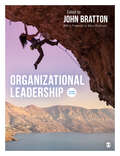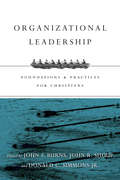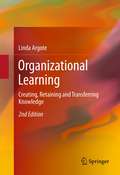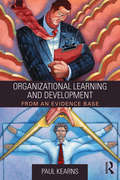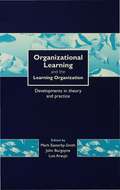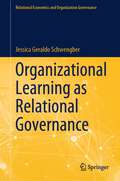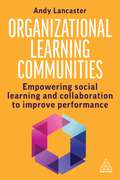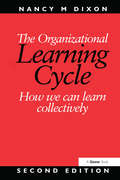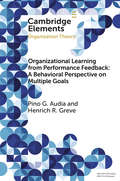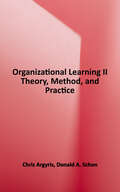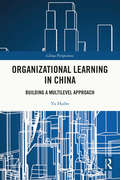- Table View
- List View
Organizational Influence Processes
by Robert W. Allen Lyman W. Porter H.L. AngleWith more than two-thirds fresh material, this new updated edition of Organizational Influence Processes provides an overview of the most important scholarly work on topics related to the exercise of influence by individuals and groups within organizations. In selecting articles for inclusion the editors were guided by the conviction that the most useful and interesting way to view organizational influence is to take a directional approach - that is, to consider the process from the perspective of downward, lateral, and upward influence. They have organized the readings around this framework, preceded by an introductory group of articles dealing more generally with the nature of influence processes and power. The book includes both classic readings and the latest cutting edge research from some of the most respected experts writing in the field. It will be equally useful for any upper level undergraduate or graduate course concerned with organizational behavior, group behavior, leadership or power and politics.
Organizational Innovation (Routledge Revivals)
by Jerald HagePublished in 1998. In the past year the 300 largest global companies increased their research budgets by an average of 12 per cent. Governments now measure how technologically advanced they are as they worry about their trade balances and unemployment. Many public sector organizations, for example hospitals, universities and welfare agencies, are struggling to keep up with the rate of technological progress. The selections in this book provide a number of insights on how private firms can be more innovative and public sector organizations can keep up with rapid technological change. They emphasize both radical and incremental innovations and both product and process innovation. In particular the advanced manufacturing technologies so central to Piore and Sabel’s ’Second Industrial Divide’ receive a great deal of attention. Finally, the consequences of innovation are the focus of the last section.
Organizational Innovation and Change
by Cecilia Rossignoli Mauro Gatti Rocco AgrifoglioThis book explores a range of critical issues and emerging topics relevant to the linkages between information technologies and organizational systems. It encourages debate and opens up new avenues of inquiry in the fields of Information Systems, organization and management studies by investigating selected themes of growing research interest from multiple disciplinary perspectives such as organizational innovation and impact, information technology, innovation transfer, and knowledge management. The volume is divided into two sections, each of which focuses on a specific theme: ICT, organizational innovation and change; and ICT and knowledge management. The content of each section is based on a selection of the best papers (original double-blind peer-reviewed contributions) presented at the annual conference of the Italian chapter of the AIS, held in Genoa, Italy in November 2014.
Organizational Innovation in Public Services
by Pekka Valkama Stephen J. Bailey Ari-Veikko AnttiroikoIn the wake of the economic crisis, many public services are facing a challenging environment in which they receive less funding but are expected to deliver better services. Organisational Innovation in Public Services develops new theoretical models and analyses case studies to provide an important insight into how to modernise public services.
Organizational Innovation in the Digital Age
by Carolina Machado J. Paulo DavimThis book focuses on how businesses manage organizational innovation processes. It explores the innovative policies and practices that organizations need to develop to allow them to be successful in this digital age. These policies will be based on key resources such as research and development and human resources and need to enable companies to respond to challenges they may face due to the digital economy. It explains how organizational innovation can be used to improve business’s development, performance, conduct and outcomes. Contributing to stimulate the growth and development of each individual in a dynamic, competitive and global economy, the present book can be used by a diverse range of readers, including academics, researchers, managers and engineers interested in matters related with Organizational Innovation in the Digital Age.
Organizational Integrity: Individual Misconduct And The Legal Structure Of Society (Springerbriefs In Business Ser.)
by Carsten StarkThis book describes the results of a research project on compliance and organizational integrity, financed by the German government and conducted over the last three years. The book offers a theoretical framework and valid instruments for measuring the outcome of compliance management: organizational integrity. To pinpoint the specifics of organizational integrity, and to create a framework for assessment, the book analyzes not only the cases of Siemens and Deutsche Bank but also a specific form of organization: governmental organizations. The book includes the results of a survey of employees in five German cities, in the course of which the author conducted interviews with the personnel responsible for compliance in different organizations. In addition, during their discussions he analyzed the administrative staff with regard to the decision-making processes they were involved in.
Organizational Intelligence
by Lynn Kearny Kenneth H. SilberThis book provides professionals with a clear, simple model for understanding the business of the organizations in which they work, analyzing organizational performance problems, and explaining their ideas in business language. It includes a wealth of worksheets that help to identify the key issues facing the organization, identify the key measures, determine the current and desired states of those measures, determine the gaps in organization performance, communicate those gaps and their solutions to management in language that management understands. Co-published with ISPI, this resource is written for training/HPT/ID/OD/HR professionals.
Organizational Interoperability in E-Government: Lessons from 77 European Good-Practice Cases
by Hans Jochen Scholl Herbert Kubicek Ralf CimanderIn the e-government research community as well as in many national e-government programs, interoperability is widely seen as a key factor in developing effective and attractive e-services. There is also agreement that interoperability encompasses not only mere technical standards and interfaces, but also includes organizational, legal, and cultural aspects. Several interoperability frameworks have been introduced on national and international levels, and recommendations have been made for the adaptation of enterprise architectures in the public sector. Common to all these approaches is their top-down deductive procedure, which does not connect very well to the real world of e-government projects. In contrast, in this volume, which is based on empirical research, the authors introduce a bottom-up inductive approach to deal with the challenges of interoperability-related governance. Based on so-called "good-practice" cases of interoperability in e-government, they derive concepts and classifications that help to uncover and assess similarities and differences between the cases. As a result, they present an empirically based conceptual framework that details the options for IT governance of interoperability in government. In addition, their findings also make it possible to critically assess and improve other existing frameworks. With this work, which combines different thematic foci as well as a European and a US background the authors situate empirical results in the broader context of theoretical and political reflection. Thus they provide insights into strategic choices for CIOs in e-government at a national or regional level, experiences and lessons learned for managers and developers in e-government projects, and a huge set of empirical data for administrative and political scientists.
Organizational Justice and Organizational Change: Managing by Love (Routledge Focus on Business and Management)
by Dominique A. DavidAlthough various factors contribute to failed change, one of the key reasons for change failure is the inability of leaders to gain the trust of employees, to understand the interaction between their subordinates, and to convince them to support change and to commit the energy and effort necessary to implement it. The aims of this book are to establish theories in order to describe and explain how human behaviors and contexts interact dynamically in these changes, and manage change and justice by reducing inequalities, giving emphasis to distributive justice. In addition, the aim of this book is also for readers to better understand employees' perceptions of organizational justice by senior management which is particularly important during the organizational change because change cannot succeed without the acceptance and support from employees. Organizational Justice and Organizational Change: Managing by Love provides readers a theoretical understanding and recommendations for acting properly in an organization, forming a comprehensive tool and better enable practitioners to achieve management of change and justice in organizations. It will be of interest to researchers, academics, practitioners, and students in the fields of change management, organizational studies, leadership, and strategic management.
Organizational Justice during Strategic Change: The Employee’s Perspective
by Marcos Komodromos Daphne HalkiasOrganizational leaders often struggle to establish and sustain a trusting culture in times of constant changes in the corporate fabric and unethical behavior by corporate leadership. Organizational justice theory provides a means to explain and better understand employees’ perceptions of trust, fairness, and the management of change during strategic change. Qualitative studies have yet to be conducted on how an organizational justice framework would address the need of organizational justice for novel, conceptually derived accounts of non-managerial employee perspectives. The purpose of Organizational Justice during Strategic Change is to be both an academic and practical book. After presenting the theoretical elements of the topic, half the book is devoted to a detailed case study of employee interviews conducted in a large, privately-owned media organization addressing the issues of the book topic. The authors’ research findings from the case study indicated employees who experience trust and positive feelings regarding their treatment within the organization are willing to become involved in the change process and adopt positive working relationships with their colleagues and managers. This study is important for organizational management to gain knowledge and understanding on how employees’ perceptions of distrust and unfairness can lead to resistance and negative behaviors toward organizations and management during strategic change.
Organizational Justice in Mergers and Acquisitions: Antecedents and Outcomes
by Nicholas JacksonThis book provides a unique account of how perceived justice is influenced by various aspects of an organizational merger and investigates the impact on behavior for those involved in the process. Drawing from both psychological and sociological insights, the author considers justice from an individual and group perspective in light of the political and strategic implications of mergers and acquisitions. Experiences from two empirical cases are used to consider the depth of theoretical analysis provided, in terms of practical outcomes for both organizations and employees alike. In this pioneering new book, the author explores communication, employee attitudes, trust and commitment, and the psychological contract between the employee and the organization, emphasizing the importance of developing a new meaning of organizational culture. Although primarily aimed at an academic audience, this book will also be useful to practitioners as it illuminates the potential pitfalls of overlooking the importance of fair treatment in the workplace.
Organizational Leadership
by John BrattonOrganizational Leadership provides an accessible, critical and engaging analysis of what constitutes &‘leadership&’ today. Demonstrating leadership as an interconnected process between leaders, followers and context, the book ensures a rounded understanding of theory and practice to support students throughout their course and future career. Part 1: Contextualising Leadership examines the internal and external forces influencing leadership, addressing issues such as ethics, power, culture and innovation. Part 2: Leadership Theories reviews and analyses traditional and contemporary theories of leadership. Part 3: Managing People and Leadership builds on the idea of leadership as a human process and considers how complementary aspects of HRM can inform leadership practice and its outcomes on employees and organizational performance. Part 4: Contemporary Leadership considers topical issues including the shift of leadership studies towards followership, gender and leadership and pro-environmental leadership. Bringing complex theories and concepts to life through a range of case studies and examples, the book is further supported by a series of fascinating expert video conversations with those in leadership roles. From small social businesses to major multi-nationals, from the NHS to the frontline military teams, the videos offer a unique insight into the diverse reality of leadership in practice today.
Organizational Leadership
by John BrattonOrganizational Leadership provides an accessible, critical and engaging analysis of what constitutes &‘leadership&’ today. Demonstrating leadership as an interconnected process between leaders, followers and context, the book ensures a rounded understanding of theory and practice to support students throughout their course and future career. Part 1: Contextualising Leadership examines the internal and external forces influencing leadership, addressing issues such as ethics, power, culture and innovation. Part 2: Leadership Theories reviews and analyses traditional and contemporary theories of leadership. Part 3: Managing People and Leadership builds on the idea of leadership as a human process and considers how complementary aspects of HRM can inform leadership practice and its outcomes on employees and organizational performance. Part 4: Contemporary Leadership considers topical issues including the shift of leadership studies towards followership, gender and leadership and pro-environmental leadership. Bringing complex theories and concepts to life through a range of case studies and examples, the book is further supported by a series of fascinating expert video conversations with those in leadership roles. From small social businesses to major multi-nationals, from the NHS to the frontline military teams, the videos offer a unique insight into the diverse reality of leadership in practice today.
Organizational Leadership
by John BrattonUnderstand the reality of contemporary organizational leadership with the second edition of this thought-provoking textbook. Through an analysis of key theories and topical issues such as innovation, gender, power, ethics and environmental sustainability, the authors deftly illustrate how leadership cannot be extricated from the wider organizational context and why leadership is increasingly seen as a shared endeavour between leaders and followers. The book has been fully updated, with a new introduction discussing the challenges faced by leaders during the Covid-19 pandemic as well as a Foreword by Mary Robinson. NEW to this edition: A new chapter on Team Leadership looks at team dynamics, the role of technology in teamworking and the challenges arising for virtual teams A new chapter on Leadership and Artificial Intelligence covers the rise of AI and big data, and how AI affects the employment relationship and leader-follower relations A new Ethical Spotlight feature in all chapters explores ethical issues faced by leaders and encourages reflection Suitable for undergraduate and postgraduate students studying leadership. John Bratton is Honorary Professor in the Management School at Queen′s University Belfast, Northern Ireland.
Organizational Leadership
by John BrattonUnderstand the reality of contemporary organizational leadership with the second edition of this thought-provoking textbook. Through an analysis of key theories and topical issues such as innovation, gender, power, ethics and environmental sustainability, the authors deftly illustrate how leadership cannot be extricated from the wider organizational context and why leadership is increasingly seen as a shared endeavour between leaders and followers. The book has been fully updated, with a new introduction discussing the challenges faced by leaders during the Covid-19 pandemic as well as a Foreword by Mary Robinson. NEW to this edition: A new chapter on Team Leadership looks at team dynamics, the role of technology in teamworking and the challenges arising for virtual teams A new chapter on Leadership and Artificial Intelligence covers the rise of AI and big data, and how AI affects the employment relationship and leader-follower relations A new Ethical Spotlight feature in all chapters explores ethical issues faced by leaders and encourages reflection Suitable for undergraduate and postgraduate students studying leadership. John Bratton is Honorary Professor in the Management School at Queen′s University Belfast, Northern Ireland.
Organizational Leadership: Foundations and Practices for Christians
by Jack Burns John R. Shoup Donald C. SimmonsKingdom leadership does not begin and end at the church door. Christians are called to conduct leadership in government, commerce, schools, neighborhoods, families, para-church ministries and a myriad other contexts. God has given us many gifts, and our responsibility is to be stewards of those gifts, and use them to do the King's work. In that context, this comprehensive text explores key facets of leadership from a Christian worldview so as to equip people to conduct leadership more authentically than would be possible under alternative paradigms. The book begins with the seldom considered theological foundations of leadership while also tracing the historic roots of management, organization and leadership theories. All of this leads to a robust discussion of five essential challenges and practices--communication, negotiation, decision-making, financial stewardship and personal development. The combined efforts of these experts in the field provide a practical theology of leadership from a Christian worldview for emerging and established leaders. Here is the foundation needed for those who want to conduct leadership in a manner consistent with their faith in both religious and nonreligious organizational contexts.
Organizational Learning
by Linda ArgoteWhy do some organizations learn at faster rates than others? Why do organizations "forget"? Could productivity gains acquired in one part of an organization be transferred to another? These are among the questions addressed in Organizational Learning: Creating, Retaining and Transferring Knowledge. Since its original publication in 1999, this book has set the standard for research and analysis in the field. This fully updated and expanded edition showcases the most current research and insights, featuring a new chapter that provides a theoretical framework for analyzing organizational learning and presents evidence about how the organizational context affects learning processes and outcomes. Drawing from a wide array of studies across the spectrum of management, economics, sociology, and psychology, Organizational Learning explores the dynamics of learning curves in organizations, with particular emphasis on how individuals and groups generate, share, reinforce, and sometimes forget knowledge. With an increased emphasis on service organizations, including healthcare, Linda Argote demonstrates that organizations vary dramatically in the rates at which they learn--with profound implications for productivity, performance, and managerial and strategic decision making.
Organizational Learning and Development: From an Evidence Base
by Paul KearnsIt is now widely accepted that organizational maturity is dependent on being able to reorganize on a continuous basis and learn faster and more effectively than your competitors. Organizations that want to be sure they are competing at the highest level need clear indicators that their organizational learning and development capability is fully functional. This new book by Paul Kearns focuses on the need for an evidence-based approach to learning and development, bringing together the author’s extensive knowledge of HRM and organizational learning with new developments in the field. The book demonstrates how evidence evaluation can improve professionalism in organizational design and development, showing that this approach can create value not just for shareholders, but for employees and society as a whole. Organizational Learning and Development: From an Evidence Base is the perfect book for postgraduate students studying on evidence-based HRM courses and for the reflective learning and development practitioner.
Organizational Learning and the Learning Organization: Developments in Theory and Practice
by Mark Easterby-Smith Luis Araujo John G Burgoyne`The introduction chaper by Mark Easterby-Smith and Luis Araujo introduces the reader to the unresolved issues with which the field is still grappling today.... All in all, this is an interesting and useful book for both researcher and manager alike. First, and perhaps most importantly, the book incorporates multiple perspectives on learning - the psychological, sociological and the philosophical... Second, the book is neither purely theory driven, nor purely empirically driven. Theoretical contributions are complemented by empirical studies which help to illustrate the application of the theoretical contructs. I suspect that this would be of immense value to the practicing manager. Finally, the book provides a critical commentary on the state of the field in a nice compact way which should enhance its value to scholars in this area... a book which is both useful and interesting' - Organisational Studies `[M]ost importantly, the book incorporates multiple perspectives on learning - the psychological, sociological and the philosohical... provides a critical commentary on the state of the field in a nice, compact way which should enhance its value to scholars' - Organization Studies `A valuable resource for academics and practitioners in management and corporate strategy, as well as those involved in mangement training and development' - European Foundation for Management Development `This is a particularly interesting and useful work because it combines some chapters which deal primarily in concepts or indeed theories, and others which describe the experiences of trying to carry out the practices involved in creating both/either organisational learning and/or the learning organisation' -Industrial and Commercial Training 'The editors' overall assessment is that there has been insufficient dialogue between the two camps of action research and theorizing.... As a contribution to mapping this divided house, the text is an apt illustration of these problems. The editor's overview is of interest...' - Stephen Gibb, University of Strathclyde, MCB University Press The debates surrounding concepts of `organizational learning' and the `learning organization' receive a welcome synthezis in this book. International experts explore the links between the two fields of enquiry, which hitherto, despite their intersecting concerns, have represented separate constituencies, literatures and perspectives. The book provides a much-needed integrated framework of concepts and theories which draws on current insights from management cognition, theories of knowledge and learning, management practice and work psychology.
Organizational Learning as Relational Governance (Relational Economics and Organization Governance)
by Jessica Geraldo SchwengberThis book critically examines existing organizational learning theories that often center on employees and adopt a neo-classical organizational view. In this book, organizational learning (OL) is conceptualized from a relational governance perspective. Departing from the relational economics approach, it describes organizations as dynamic nexuses of stakeholders' resources and interests, extending beyond conventional intra-organizational contexts to encompass an open systems view. By viewing organizations as independent entities, distinct from individual stakeholders, the author introduces the concept of transactions as the fundamental unit of analysis in organization theory. Stakeholders contribute diverse rationalities, and OL emerges as the process of relationalizing these rationalities, enabling multi-contextual transactions within organizations. This book sheds light on epistemological and ontological challenges in OL literature, such as the OL paradox and anthropomorphism. To address these issues, the author advocates a shift from methodological individualism to methodological relationism, wherein OL becomes a micro-meso-relational process involving both stakeholders and the organization as an entity. Combining conceptual insights with empirical evidence from a multinational company's case study, the book showcases how relational learning can be practically applied in organizations. The findings corroborate the conceptual framework, supporting the notion of organizations as resource-rich nexuses and learning as a comprehensive relational process involving both entities and stakeholders. This book offers an essential contribution to the field. It appeals to scholars and practitioners interested in organizational studies, corporate governance, and relational economics.
Organizational Learning Communities: Empowering Social Learning and Collaboration to Improve Performance
by Andy LancasterLearning communities transform organizations through sharing knowledge, spearheading practice, solving problems, seeding innovation and supercharging development. So how can you develop a culture of learning in your organization? Organizational Learning Communities answers this question and explains how and why this approach can improve individual employee performance and drive overall business results. Written by a leading voice in the learning profession, this book contains everything that Learning and Development (L&D) practitioners need to know to successfully embed learning communities in their organizations. Following the 7Cs model of Cause, Culture, Conditions, Cadence, Content, Contributions and Credit, the book establishes the key factors that underpin thriving learning communities as well as the benefits of social and collaborative learning in the company. This practical guide establishes strategies to drive community impact and report success to stakeholders, drawing widely on evidence-based research and real-world examples. Each chapter ends with reflective questions to support transfer to the reader's context. This is essential reading for those involved in facilitating learning communities, or planning on pioneering one, to empower their organization's productivity and performance.
The Organizational Learning Cycle: How We Can Learn Collectively
by Nancy M. DixonThe Organizational Learning Cycle was the first book to provide the theory that underpins organizational learning. Its sophisticated approach enabled readers to not only understand how, but more importantly why, organizations are able to learn. This new edition takes the original concepts and theories and shows how they might, and are, being put into action. With five new or completely revised chapters, Nancy Dixon describes the kind of infrastructure organizations need to put in place; there are examples of knowledge databases, whole systems in the room processes and after-action reviews originating from organizations that are making real progress with these ideas. A clearer relationship between organizational learning and more participative forms of organizational governance is drawn, along with responsibilities that employees need to take on to enable, and partake in, collective learning. With new case material from BP, the US Army, Ernst and Young, and the Bank of Montreal, for example, this book shows how you can make use of the collective reasoning, intelligence and knowledge of the organization and channel it into its ongoing and future development.
Organizational Learning from Performance Feedback: A Multiple Goals Perspective (Elements in Organization Theory)
by Pino G. Audia Henrich R. GreveThis Element synthesizes the current state of research on organizational learning from performance feedback and develops a new perspective that deals with the influence of multiple goals. In keeping with the centrality of motives in Cyert & March's influential model, this new perspective rests on a foundation of individual level behaviors that are responsive to mechanisms at the organizational and environmental level of analysis. A key aim is to lay out an agenda for a new wave of empirical research on the interconnections of decision-makers, organizations, and the environment that influence organizational responses to performance.
Organizational Learning II: Theory, Method, And Practice (Addison-wesley Od Ser.)
by Donald A. Schon Chris ArgyrisA member of the PH OD Series! Organizational Learning II expands and updates the ideas and concepts of the authors’ ground- breaking first book. With new examples and the most up-to-date information on the technical aspects of organizational and management theory, Argyris and Schon demonstrate how the research and practice of organizational learning can be incorporated into today’s business environment.
Organizational Learning in China: Building a Multilevel Approach (China Perspectives)
by Yu HaiboFrom the perspective of behavioural science, this book systematically investigates organizational learning in Chinese organizations bsed on multilevel theory over the past 20 years. The findings contribute to the theory and practice of organizational learning and give insights into the construction of learning organizations.Revisiting existing studies on organizational learning, the author reconceptualises organizational learning and constructs an integrative model, which is corroborated and then supplemented by empirical research. Based on samples and materials from 3,000 managers and employees in organizations from all over China, the book further elaborates this integrative model covering the multilevel structure, trans-level functions and generative mechanisms that figure prominently in organizational learning in Chinese organizations. This framework helps enhance the organizational learning ability and the establishment of a learning culture, while offering possible directions for updating research methods and a stereoscopic theory of organizational learning.The book will be a good reference for management practitioners, students and academics interested in organizational behaviour, human resource management, innovation management, and multilevel perspective.
